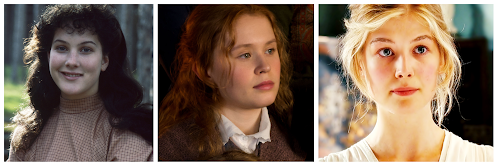Major Role Models from Minor Characters: It's Okay to be "Average"
When
I was young, I wished for strength like Jo March. I wanted the persistence of
Elizabeth Bennett. I envied Anne Shirley’s bravery. I dreamed of being someone
who was unafraid of a challenge. From reading literature, I created an image in
my mind of who I should be. But because of my introspection, I found myself far
from meeting the mark I had set. As an introvert, I love the peace that comes
from security. I enjoy spending time with those I love. If a conflict arises, I
prefer others to approach the situation, instead of myself. I hardly could
compare to the characters I desired to be.
For a while, I was ashamed of my true
colors. In a world that pushes for females to lead more, act out more, and take
over the world—was I failing if I became something far different? To answer my
question, I dove back into the literary tales of my childhood. Perusing the
books for a third or fourth time, I realized that the leads—Jo, Elizabeth, and
Anne—displayed only some of the positive qualities a female should imitate. In
fact, they met their goals through the efforts of the lesser-known characters
that surrounded them. Their sisters, best friends, and supporters helped them along
their way. And the stories of these minor characters, while not the same as the
major characters, reveal characteristics worth emulating.
The beloved character Beth March,
from Little
Women, caught my attention
first. While pitied for her sorrowful passing, she hardly gets the limelight in
the famous story by Louisa May Alcott. Yet, Beth’s illness highlights her greatest
quality, the ability to be content with life. From the beginning of the story,
Beth tends to fade into the background. She is less outspoken compared to her
sisters and experiences physical weakness. She knows her life will fail to be
as exciting as the lives of those around her. But she never gives up on making
the best of what is, even when that means sacrificing her time to help others.
My thoughts settled next on the charming
Jane Bennett, from Jane Austen’s Pride
and Prejudice. Contrasting with her
sister’s stubbornness, Jane’s character draws readers to her demure spirit and
soft features. But below these levels lies a depth that should be appreciated
as well. Jane chooses gentleness, even when presented with uncomfortable
situations. When Bingley chooses to not visit Jane in London, she could have
flown into a fit of tears. No one would have blamed her for being upset. But determined
to remain calm, she chooses patience, even when Elizabeth thinks Jane has every
right to be angry. In time, Jane does receive what she desires, but without the
burst of emotion that her family members tend to portray in similar scenarios.
Last, I considered
Diana Barry, a character from L. M. Montgomery’s Anne
of Green Gables. When readers think
of Diana, they most likely think of her friendship with Anne Shirley. But beyond
this relationship, she fails to receive an acknowledgement from literary fans. Diana
is Anne’s opposite in many ways—she is more levelheaded, realistic, and content
to live within the status quo. But her loyalty to Anne overcomes any of the problems
in their friendship. Even when Anne makes mistakes, Diana chooses to be there
for her. She sees the value in their time spent together.
As I reflect on
these classics, I see the importance of all the traits these characters represent.
Major characters like Jo, Elizabeth, and Anne gave us a dream to achieve. By
going against common culture, they show women that they can overcome obstacles
to reach their goals. Women can be leaders too.
But minor characters such as Beth, Jane, and Diana also give females a role to live up to. Strength, bravery, and persistence can only go so far without contentment, patience, and loyalty. We need all the qualities. A strong female should be a gentle one too. A patient female should never give up. The beauty comes in being oneself and striving every day to be a little bit better. Some may receive less recognition because of their personality, but an introvert or an extrovert can both get a job done. We should honor them both and learn from their examples.


Comments
Post a Comment